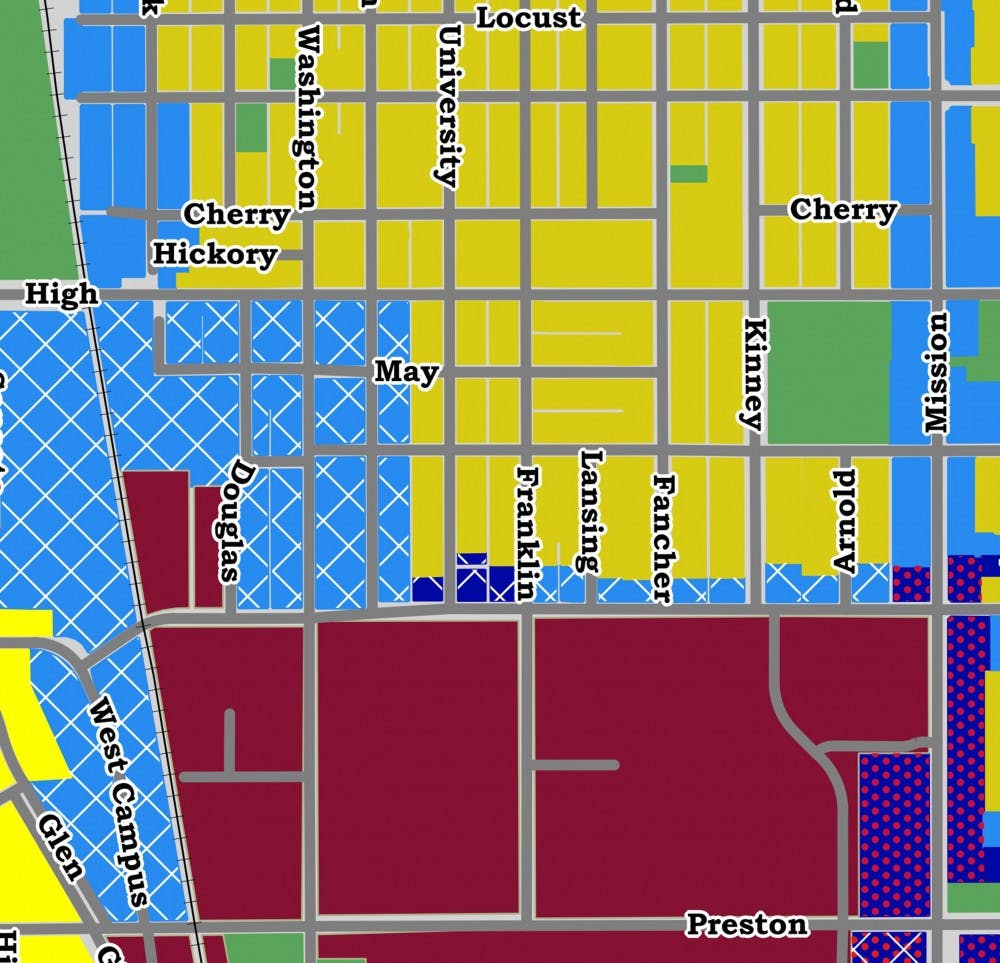Developers, city officials disagree on zoning ordinance impact on students
Mount Pleasant plans to adopt a new zoning ordinance for the first time in 33 years, but the changes have been met with opposition from some local developers.
The proposed character-based ordinance would completely replace the city’s current zoning code and features new designations, regulations and approaches toward city planning.
“It’s a drastic change and people might be overwhelmed,” said City Manager Nancy Ridley. “But this ordinance reflects the community we want to be and is one of those things that over time we’ll be able to look back on and see the positive impact.”
The plan must first be approved by the Planning Commission, which will hold a public hearing and vote Thursday, Oct. 19. The City Commission will then make the final decision after a second public hearing on Nov. 13.
Both hearings will take place at 7 p.m. in City Hall, 320 W. Broadway St.
While the proposed ordinance does overhaul the zoning code -- most members of the community won’t notice, Ridley said.
However, some property owners said the plan would hurt businesses and drive students out of city limits.
North of campus
The most controversial aspect of the new ordinance are changes made to the area directly north of Central Michigan University’s campus -- specifically on University, Franklin and Lansing streets. For decades, that area south of High Street has been a location for student rentals.
The new ordinance would rezone those properties to single-family dwellings, which would render all multiple-tenant buildings as nonconforming. That designation won’t affect current occupants, and owners would be able to continue renting to multiple tenants as long as a rental license is assigned to the building.
However, the change raises fear for some owners about the viability of their properties.
Robin Stressman, associate broker at Coldwell Banker Mt. Pleasant Realty & Assoc., said the new zoning could hurt property values and limit an owner’s ability to sell.
“Realtors are into property rights,” Stressman said. “The whole idea of property rights is that you can do with your property what you want -- like sell a house or rent it out.”
A nonconforming designation could also make it more difficult to repair or renovate buildings, she said.
Brandon LaBelle, owner of LaBelle Realty, said he believes the changes will hurt students and doesn’t see the area as a viable market for single-family homes.
The current zoning ordinance allows for both types of housing. Stressman and LaBelle said homeowners could live in the area if they wanted to -- but no one has ever expressed an interest.
“Maybe the commission knows something I don’t,” LaBelle said. “I haven’t heard of any families interested in moving into an area surrounded by students (and that’s) right next to a college campus.”
LaBelle said “pushing students out” of the area wouldn’t just hurt property owners. He believes downtown businesses could lose customers and declining property taxes would reduce funding for the city.
“Have they done any studies on the economic impact of all of this?” LaBelle asked.
Assessors looked at differences between single family and rental property value, said City Planner Jacob Kain, but they found only a modest impact.
Kain doesn’t “buy the argument” that tax revenue would decrease or that families don’t want to live in the area. He pointed to houses a few blocks north, which were rezoned from multi-residential use to single-family use in 1984, where families and students live.
“If you go to any college community, you will find neighborhoods next to campus that families live in,” Kain said. “I don’t understand why a family can cope with living near student housing in one place, but never would in another.”
Kain added a major reason families don’t purchase properties south of High Street is because investment properties are rarely listed publicly.
“There’s never an opportunity for a family to buy it,” he said. “Owners in that area don’t typically put up a for sale sign. They call an investment property owners and ask if they’re interested.”
The area wouldn’t immediately change to single-family housing, Kain said. He added that a rental owner could sell their nonconforming property, transfer the associated rental license and the new purchaser could continue renting out the building.
For Kain, the zoning change is a signal to investors to put money in family-owned housing.
More than 65 percent of Mount Pleasant home properties are rental units, according to census data compiled by the city.
Those numbers are out of proportion, said Mayor Kathy Ling.
“We hear a common concern from people looking to move to Mount Pleasant,” Ling said. “There are limited housing choices for families or people looking to live by themselves.”
From Ling's perspective, a major purpose of the new ordinance is to deal with the imbalance of choices. Ling said the discussion is often framed as “student versus nonstudent,” but it’s an issue of what type of affordable housing is available for either.
Encouraging owner-occupied housing north of campus will help solve the problem, she said.
Robin Stressman doesn’t see a problem.
She pulled up listings for Mount Pleasant homes in the range of $50,000-$250,000 and found 87 properties for sale as of Oct. 17.
“We have tons of single-family housing available,” Stressman said. “This is another example of commissioners coming in with good intentions and failing to solve the problem.”
Commissioners are also looking at affordability, Ling said, and the city has enough “dorm-style” student housing.
“A certain type of housing unit has worked very well for some developers,” Ling said. “They have a business model and they are entitled to proceed with that model.
“It’s the job of the City Commission to make sure that what’s being built meets the needs of the community. That includes the student population, which is an incredibly important part of this community.”




